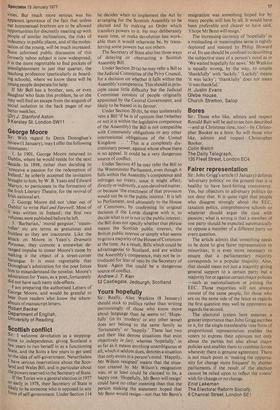Fairer representation
Sir : John Grigg's article (1 January) defends 'adversary politics' on the ground that it is healthy to have hard-hitting controversy. Yes, but objectors to adversary politics do not deny that. It is quite right that people who disagree strongly about the EEC, taxation policy, comprehensive schools or whatever should argue the case with passion; what is wrong is that a member of one party should be expected automatically to oppose a member of a different party on every question.
The article admits that something needs to be done to give fairer representation to minorities; it is even more necessary to ensure that a parliamentary majority corresponds to a popular majority. Also, that should mean not just a majority giving general support to a certain party but a majority for or against certain major policies —such as nationalisation or joining the EEC. Those majorities will not always consist of the same people, for those who are on the same side of the fence as regards the first question may well be opponents as regards the second.
The electoral system here assumes a greater importance than John Grigg ascribes to it, for the single transferable vote form of proportional representation enables the voters to express their opinions not only about the parties but also about major policies and enables them to combine forces wherever there is genuine agreement. There is not much point in 'making the opportunity for change more frequent' by shorter parliaments if the result of the election cannot be relied upon to reflect the voters' wish for change or no change.
Enid Lakeman The Electoral Reform Society, 6 Chancel Street, London SE1


































 Previous page
Previous page